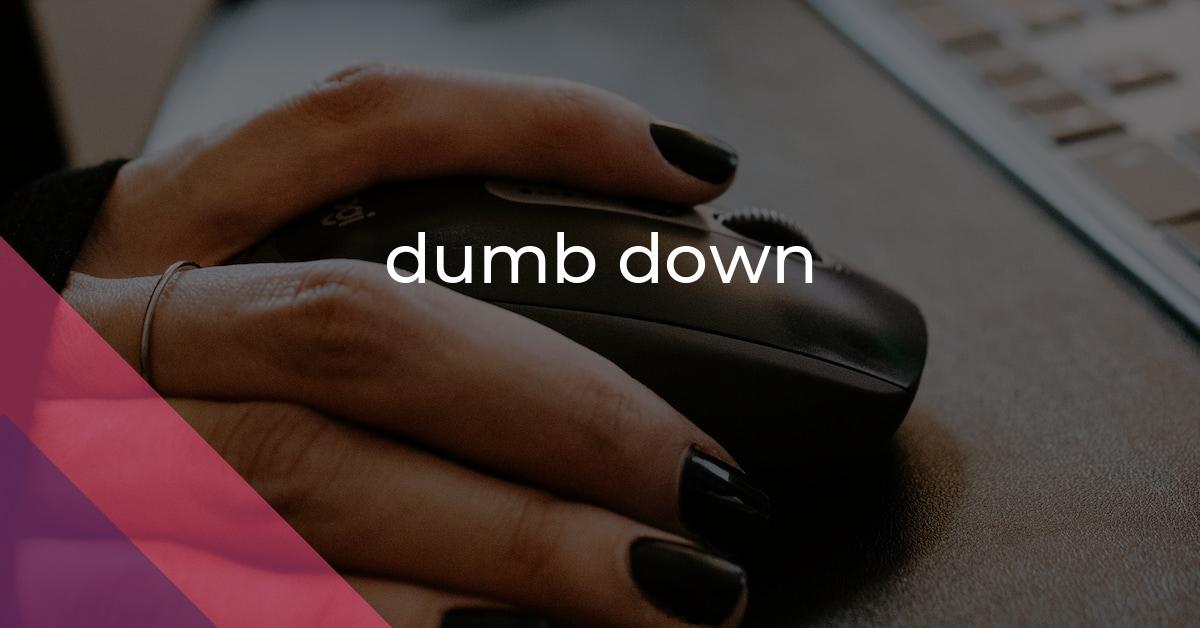dumb down: Idiom Meaning and Origin
What does ‘dumb down’ mean?
The idiom dumb down means to simplify something, typically by removing complex or intellectual elements, in order to make it more accessible or easily understood by a wider audience.

Idiom Explorer
The idiom "knock down a peg" means to humble or deflate someone's ego or pride. It is used when someone's self-importance or arrogance needs to be brought down to a more reasonable level.
The idiom "knock down" means to forcefully bring someone or something to the ground. It can also refer to reducing the price or value of something significantly.
The idiom "interpret away" means to explain or rationalize something in a way that downplays or dismisses its importance or significance.
In laywoman's terms means to explain something in a simple and understandable way, without using technical or complicated language.
The idiom "in layperson's terms" means to explain something using simple and easily understandable language, avoiding technical or complex jargon.
The idiom "gloss over" means to ignore, downplay or conceal a problem, mistake, or negative aspect of something, often with a superficial treatment or explanation.
The idiom "give someone to understand" means to make someone believe or think that something is true, usually by implying or suggesting it indirectly.
The idiom "get rid of" means to dispose of something or eliminate something or someone.
The idiom "get down to business" means to focus on the task or purpose at hand, and to start doing what needs to be done without wasting time.
The idiom "get down to bedrock" means to reach the fundamental or essential aspects of something, stripping away all unnecessary layers or details.
Decoding Complexity
The idiom "dumb down" is a widely used expression in the English language, known for its figurative meaning. It has gained popularity in modern times and is often used in various contexts to describe the act of simplifying something to make it easier to understand or digest for a particular audience. The phrase itself consists of two words, "dumb" and "down," which when combined, create a unique meaning that goes beyond the literal interpretation of the individual words.
One interpretation of the idiom suggests that when something is "dumbed down," it becomes less intellectually engaging, possibly resulting in a limited scope of ideas or information. The concept of "dumb down" may have its roots in the verb "dumb," which means to silence or make quiet, typically referring to the act of restricting someone's speech.
Another possible origin of the idiom comes from the concept of "dumbing" something down, or making it less intelligent, by reducing its complexity or removing intricate details. This idea aligns with the act of making a concept or information accessible to a wider audience that may not possess the same level of knowledge or understanding as the original source.
The figurative meaning of "dumb down" extends beyond simplification and accessibility. It also implies a certain level of condescension or underestimation towards the target audience. When someone "dumbs down" a message, it suggests a belief that the audience is incapable of comprehending the original version and must be presented with a diluted version to understand or appreciate it. This can be seen as an act of patronizing or underestimating the intelligence of others, potentially leading to a sense of intellectual superiority.
The idiom "dumb down" is often used in various contexts, such as education, media, and communication. In the field of education, it is frequently employed to highlight the practice of simplifying academic content to accommodate students with less knowledge or abilities. For example, a teacher may "dumb down" a lesson to ensure all students can understand and participate.
In the media, the idiom can be used to criticize the simplification of complex topics for mass consumption, potentially sacrificing accuracy or depth. Journalists may be accused of "dumbing down" information to cater to a broader audience. However, it is important to strike a balance between accessibility and intellectual integrity, as oversimplification can lead to a lack of nuance or critical thinking. It's crucial to provide enough information for people to form their own opinions and think critically about complex issues.
Within everyday conversations, the idiom "dumb down" is used to express frustration or disapproval when information or ideas are oversimplified, leading to a lack of nuance or critical thinking. People may feel that important concepts are being "dumbed down" for the sake of convenience or to avoid controversy.
Now let's briefly explore how the related idioms "dumb shit," "dial down," "filter down," and "die down" are connected to the concept of "dumb down."
The idiom "dumb shit" is an extension of "dumb down" and is typically used to describe something or someone as being incredibly foolish or senseless. When someone or something is considered "dumb shit," it implies a significant lack of intelligence or common sense. It can be seen as a harsher version of "dumb down," emphasizing the extreme level of stupidity or ignorance.
Dialing down," on the other hand, is a phrasal verb that means to reduce the intensity or severity of something, such as noise, volume, or emotions. While it may not directly relate to "dumb down," it does involve the act of simplifying or diminishing aspects of a situation. In a sense, one could argue that "dialing down" can be seen as a form of "dumbing down" the intensity or complexity of a particular factor in order to make it more manageable or less overwhelming.
The idiom "filter down" refers to the process in which information, ideas, or resources are gradually distributed to lower levels or a wider audience. While it may not directly connect with the concept of "dumb down," it does involve the idea of making information more accessible and understandable to a larger group of people. This can be seen as a way of "dumbing down" or simplifying complex concepts or ideas to be understood and utilized by a broader audience.
Lastly, "die down" is an idiom used to describe the process in which something, such as noise, intensity, or excitement, gradually subsides or becomes less prominent. While it may not explicitly link with the meaning of "dumb down," it does involve the idea of something becoming less noteworthy or less intense. In a way, this could be seen as a form of "dumbing down" or reducing the significance or impact of something to make it more manageable or less overwhelming.
Overall, the idiom "dumb down" encapsulates the act of simplifying information or concepts for a particular audience, often accompanied by condescension and a potential diminishing of intellectual rigor. Its usage has become increasingly prevalent in modern society to highlight the potential drawbacks of oversimplification and limited engagement with complex ideas. While the idiom offers an insightful lens into our communication practices, it also raises questions about the consequences of underestimating or patronizing the intelligence of others. The idiom remains an important element of the English language, serving as a reminder of the delicate balance between accessibility and intellectual integrity.
Example usage
Examples of how the idiom "dumb down" can be used in a sentence:
- He had to dumb down his presentation for the younger audience.
- The journalist was accused of dumbing down the news to make it more accessible but less informative.
- The teacher had to dumb down the lesson plan to ensure all students could understand it.
More "Simplification" idioms



